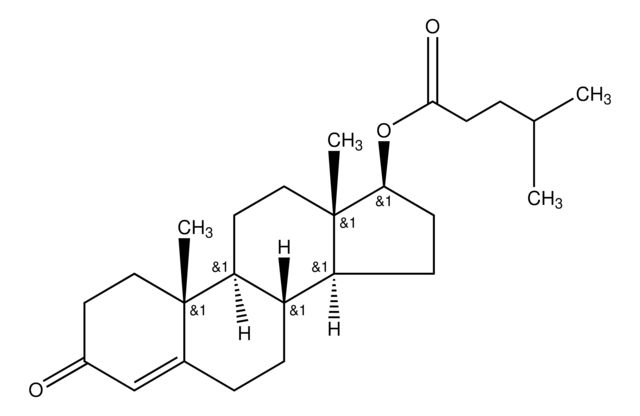Fontos dokumentumok
T0300000
Testosterone propionate
European Pharmacopoeia (EP) Reference Standard
Szinonimák:
17β-Hydroxy-4-androsten-3-one 17-propionate, 17β-Propionyloxy-4-androsten-3-one, 4-Androsten-17β-ol-3-one 17-propionate
About This Item
Javasolt termékek
grade
pharmaceutical primary standard
API-család
testosterone
gyártó/kereskedő neve
EDQM
gyógyszerellenőrzés
USDEA Schedule I
alkalmazás(ok)
pharmaceutical (small molecule)
format
neat
tárolási hőmérséklet
2-8°C
SMILES string
[H][C@@]12CCC3=CC(=O)CC[C@]3(C)[C@@]1([H])CC[C@]4(C)[C@H](CC[C@@]24[H])OC(=O)CC
InChI
1S/C22H32O3/c1-4-20(24)25-19-8-7-17-16-6-5-14-13-15(23)9-11-21(14,2)18(16)10-12-22(17,19)3/h13,16-19H,4-12H2,1-3H3/t16-,17-,18-,19-,21-,22-/m0/s1
Nemzetközi kémiai azonosító kulcs
PDMMFKSKQVNJMI-BLQWBTBKSA-N
Géninformáció
human ... AR(367)
Looking for similar products? Látogasson el ide Útmutató a termékösszehasonlításhoz
Általános leírás
Alkalmazás
Kiszerelés
Egyéb megjegyzések
kapcsolódó termék
Figyelmeztetés
Danger
Figyelmeztető mondatok
Óvintézkedésre vonatkozó mondatok
Veszélyességi osztályok
Acute Tox. 4 Oral - Aquatic Acute 1 - Carc. 2 - Repr. 1A
Tárolási osztály kódja
6.1C - Combustible acute toxic Cat.3 / toxic compounds or compounds which causing chronic effects
WGK
WGK 3
Válasszon a legfrissebb verziók közül:
Analitikai tanúsítványok (COA)
Sajnos jelenleg COA nem áll rendelkezésre ehhez a termékhez online.
Ha segítségre van szüksége, lépjen velünk kapcsolatba Vevőszolgálat
Már rendelkezik ezzel a termékkel?
Az Ön által nemrégiben megvásárolt termékekre vonatkozó dokumentumokat a Dokumentumtárban találja.
Az ügyfelek ezeket is megtekintették
Tudóscsoportunk valamennyi kutatási területen rendelkezik tapasztalattal, beleértve az élettudományt, az anyagtudományt, a kémiai szintézist, a kromatográfiát, az analitikát és még sok más területet.
Lépjen kapcsolatba a szaktanácsadással







